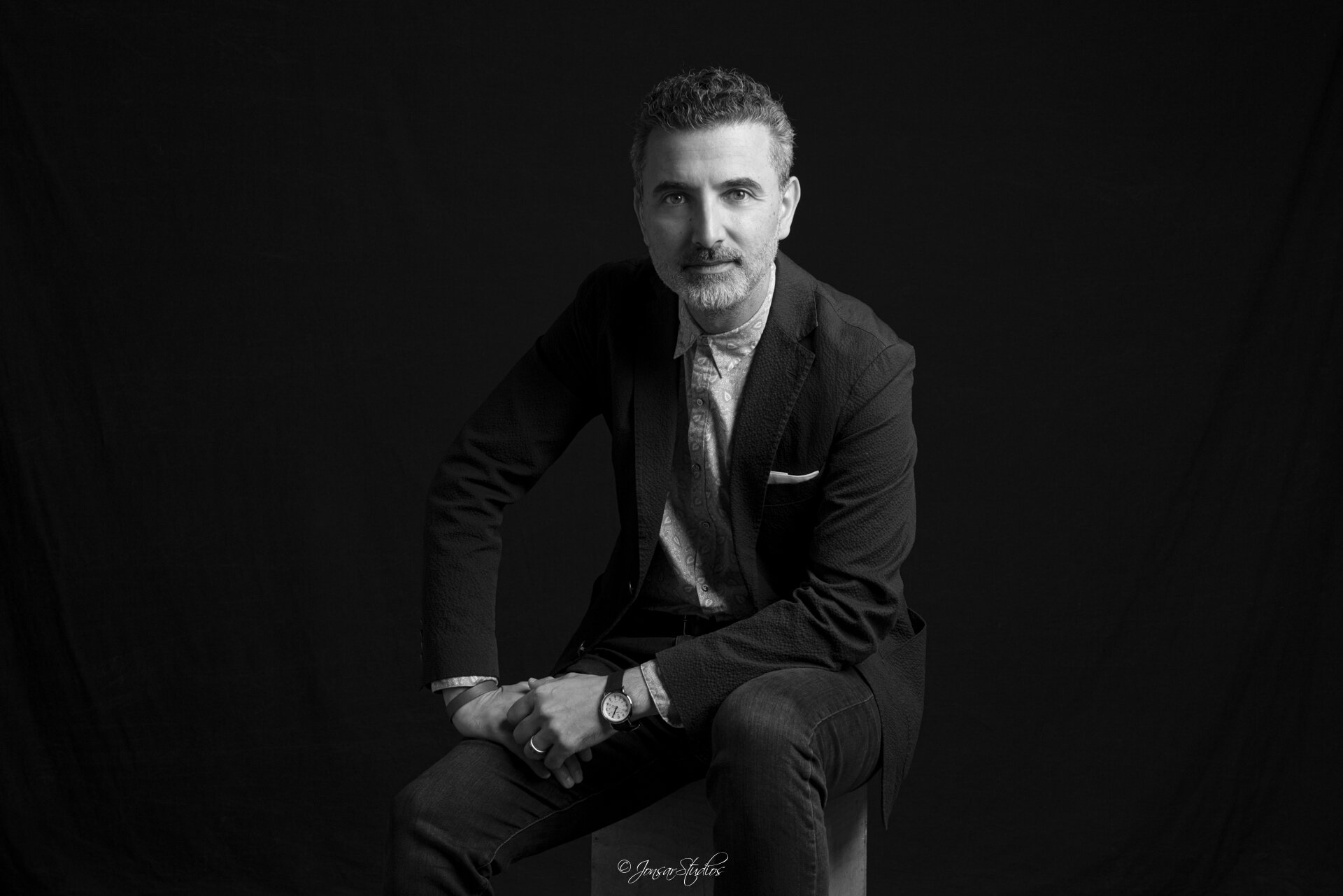Saks Afridi - Conversations with Artists
What is the art of what you do?
I investigate the life of an Insider Outsider. That's the practice of achieving a sense of belonging, of being out of place and finding happiness in a state of temporary permanence and re-contextualizing historical and cultural narratives into what we do today. All those things together make me who I am, and are also what my art practice is about. Anyone who's ever been an outsider in any form can relate to it.
What is temporary permanence?
The idea of not knowing where one is going to be tomorrow is something that frightens a lot of people. I grew up moving countries every two or three years, and I found comfort in the temporary nature of it. I continue to live that way. While New York is home, I know that nothing is permanent - everything is just a different state of temporary. Being able to find comfort in knowing that everything can change tomorrow is embracing temporary permanence.
Talk a little bit more about the concept of Insider Outsider.
I am from Pakistan -- and Pakistan today is not the place that I remember. If I’m there, I feel like an alien. I'm not from here, and sometimes I feel like an alien here. I feel like an outsider in both places, but I'm also a local in both places. I know the ins-and-outs, the people, the cultures, the subcultures of both places. I can feel completely at ease and yet there are often moments where I feel like an outsider, or there's something I say or do that makes the other realize I’m not from there. I’m different. But I also think that’s my superpower, and I like to utilize it.
How is it your superpower?
I would say I acclimate and acculturate easily -- perhaps because I've lived in different places around the world I easily adapt. I don't stick out. I can be anybody. I'm ethnically ambiguous and that’s helped me, but I can see how it's hurt so many fellow brown brothers and sisters who are not as ethnically ambiguous. We should be equally welcoming to everybody - not just people whom you're comfortable looking at or whom you're comfortable being around.
What is it about humans that we seem to readily dislike the ‘other’?
I think it's in our DNA that goes back thousands of years. Tribalism and sectarianism and separation began in large part because people don't like how ‘others’ think. If it's different from them, it's threatening.
How do we have hope as a human race if we can't go beyond tribalism? When does this planet become our tribe?
This is where Sufism and the language of love comes in. Sufism is a mystical side of Islam and I've taken some of its teachings applied them to my life. I'm not a traditional practicing Sunni Muslim; I don't pray 5 times a day, but I have learned a lot from Sufi Saints and Poets and have begun adapting the language of love in my life. I believe in five acts of love a day. And those five acts of love can come in the form of kindness, of empathy, in the form of not saying something mean about someone. Stopping yourself from saying something mean is an act of kindness. Practicing this on a daily basis, you come to a point where you don't realize you're doing it - it becomes habit. I think practicing empathy is probably the key thing that will make tribalism and sectarianism go away.
We seem to be living in a time where empathy is waning. How do you overcome that?
I think you find heroes. The heroes of our day are the people who are empathetic and the more empathetic people we have to look up to is how we will fight negativity and tribalism.
Are we taught negative thinking, or is it in our nature?
We emulate what we see and what our communities do. A casual racist remark at a dinner table that's left unchecked is how seeds are sown and over time they form into solid opinions. We can't let that happen anymore. We let shit slide for too long.
How is this the basis of your artwork?
The work I'm doing now in my art practice lies in the realm of what I call Sci-fi Sufism. It combines narratives of science fiction with the empathy of Sufism. I create new stories and narratives to create new myths. I think the more of this we have, the more utopian the world can seem. Hence, why I was in the show ‘Utopian Imagination’ at the Ford Foundation.
Sci-fi Sufism - pretty cool.
They are two very different concepts that are brought together, but they both live in the same realm. In science fiction and fantasy we look towards the stars to see what's out there. All religions have looked at God or at the Creator and towards the stars to see what’s out there. There's something hopeful about that. Whether it's a being or energy - we’ve been searching for it and have been trying to define it since as long as we've been able to walk, and I don't think that's ever going to go away. Finding truth and hope in the search is the path that science fiction goes towards and it’s what Sufism is entirely about. It’s the search for the infinite and the love for the infinite and getting lost in it and finding yourself through it. By doing this as an internal practice you externalize it to the world around you; people see how you are, and one hopes that rubs off. That's how I think we take the ‘lie factory’ and convert it.
I like your concept of five acts of love a day. I think it can spread.
I want to do more with it. It's something that you can do while living your everyday life. The hardest act of kindness is stopping yourself from saying what's on your mind -- to stop and ask, is it kind? Is it true? Is it helpful? If not, is it important to say it? Do we have to speak so much?
You've told us the art of what you do -- now tell us what you do.
I make art that comes in the form of two-dimensional and three-dimensional works. Sometimes they are sculptures, or prints, or paintings, or rugs, lenticulars, video - those are the mediums I work in. The concept determines the medium and not the other way around. I don't box myself in. If the concept tells me this is better done as a performance piece or as a sculpture then that's what it needs to be. Fluidity is very important. Very few artworks are permanent. The art piece itself is permanent but the artwork is not because it continues to evolve and develop. I guess that's why artists have periods and movements. I've only been a practicing artist since 2014.
Was it something that was building and you broke out of a box?
That's exactly what it was - years of building ideas. I started off in graphic design and then moved into advertising because I love the idea of storytelling, and I love the idea of a clever ad. I realized what I love about clever ads was the fact that they make you think - and that got me into art. Art makes you think on a whole other level. Advertising tells you what to feel but art teaches you how to feel. Art teaches you how to ask questions and doesn’t necessarily give the answers.
How did you start your practice?
Over the years I had ideas of things I wanted to make but I was unable to because there wasn't the time or I didn't know how. With the support of my wife, I quit my advertising job and started doing art full-time. I couldn't have had this journey if it wasn't for my wife. She believed in me completely and said ‘go for it.’ So I did. Those years were magical because I set up a practice and completely immersed myself in my art. I did about 18 projects in those first three years; some collaborative and some personal. Most artists don't collaborate because they don't want to give up control, but I come from advertising where work only gets better when it's made in teams. You have to be willing to give up your ideas - which again comes down to empathy. You have to leave your ego at the door. If you do things that are driven by ego you might be successful, but you won't find yourself fulfilled. Happy is the new rich. I find comfort in that - maybe because I'm not rich, but I'm 100% happy.
If you could go back to 13-year-old Saks and give him some advice, what would you say?
I would tell him to question everything and seek his own truth. I also would have told myself to follow my passion -- as opposed to starting at age 30, which is what happened.
A couple of years back I heard a quote from Keith Richards who said ‘I'm just getting good now.’
There’s nothing I can add to that. You can't top Keith Richards.
Saks Afridi is a multi-disciplinary artist living in New York City. Saks’s art practice is two-fold: Collaborative and Personal. His personal work investigates the predicaments and perplexities of the life of an ‘Insider Outsider’. This is the practice of achieving a sense of belonging while being out of place, finding happiness in a state of temporary permanence, and re-contextualizing existing historical and cultural narratives with the contemporary. Learn more about Saks and SciFi Sufism here.










